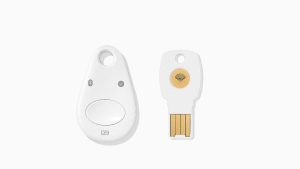- 16 November 2023
- 103
Guardians of Access: Exploring Google’s Titan Keys Revolutionizing Security

Guardians of Access: Exploring Google’s Titan Keys Revolutionizing Security
Introduction
Hello, my name is Fred Wilson and I am a cybersecurity expert and a blogger. I have been working in the field of information security for over 10 years, helping organizations and individuals protect their data and assets from various cyber threats. I am passionate about sharing my knowledge and insights with the security community and the general public.
In this article, I will explore one of the most innovative and effective security solutions in the market today: Google Titan Keys. I will explain what they are, how they work, why they are important, how to use them, and what are their future prospects and challenges. This article is relevant and important for security analysts, IT decision-makers, and business executives who want to enhance their security posture and stay ahead of the curve.
What are Google Titan Keys and How Do They Work?
Google Titan Keys are physical security tokens that provide phishing-resistant two-factor authentication (2FA) for various online services, such as Google, Facebook, Twitter, Dropbox, GitHub, and more. They are based on the FIDO (Fast Identity Online) standards, which are open and interoperable protocols that enable secure and easy authentication across the web.
Google Titan Keys are different from other security tokens in several ways. First, they have a tamper-resistant hardware chip that performs cryptographic operations and protects the private keys from physical and software attacks. Second, they have multiple form factors, such as USB-A, USB-C, NFC, and Bluetooth, that can work with different devices and browsers. Third, they have wide compatibility, as they can support both FIDO U2F (Universal 2nd Factor) and FIDO2 protocols, which enable passwordless and usernameless authentication.
The features and benefits of Google Titan Keys are summarized in the table below:
| Feature | Benefit |
|---|---|
| Tamper-resistant hardware chip | Protects the private keys from physical and software attacks |
| Multiple form factors | Works with different devices and browsers |
| Wide compatibility | Supports both FIDO U2F and FIDO2 protocols |
Why are Google Titan Keys Important for Security?
Google Titan Keys are important for security because they can help mitigate the current challenges and threats in the cybersecurity landscape, such as data breaches, phishing attacks, credential theft, and account takeover. These are some of the most common and costly cyberattacks that can compromise the security and privacy of organizations and individuals.
According to a report by IBM, the average cost of a data breach in 2020 was $3.86 million, and the average time to identify and contain a breach was 280 days. Moreover, according to a report by Google, 66% of the phishing emails that targeted Gmail users in 2019 were credential phishing, which aimed to steal the usernames and passwords of the users.
Google Titan Keys can help prevent these attacks by adding an extra layer of security to the authentication process. Unlike passwords or SMS codes, which can be stolen or intercepted by hackers, Google Titan Keys require the physical presence of the user and the token to authenticate. This makes it extremely difficult for hackers to impersonate the user or access their accounts, even if they have their credentials.
How to Use Google Titan Keys for Your Business or Personal Needs?
Using Google Titan Keys for your business or personal needs is easy and straightforward. Here are some practical guidance and tips on how to use them for various scenarios and purposes:
- How to set up and register Google Titan Keys: To set up and register your Google Titan Keys, you need to visit the Google 2-Step Verification page and follow the instructions. You can register multiple Google Titan Keys for different devices and browsers, and you can also use them with other online services that support FIDO standards.
- How to use Google Titan Keys with different devices and browsers: To use your Google Titan Keys with different devices and browsers, you need to insert the USB key or tap the NFC or Bluetooth key when prompted by the service. You may also need to enter your password or PIN, depending on the service and the protocol. You can use your Google Titan Keys with Chrome, Firefox, Edge, Safari, and other browsers that support FIDO standards.
- How to manage and update Google Titan Keys: To manage and update your Google Titan Keys, you need to visit the Google 2-Step Verification page and access the Security Key section. You can rename, remove, or add new Google Titan Keys, and you can also check the firmware version and update it if needed.
- How to troubleshoot common issues with Google Titan Keys: If you encounter any issues with your Google Titan Keys, such as losing them, breaking them, or forgetting them, you can visit the Google 2-Step Verification Troubleshooter and follow the steps to resolve them. You can also use backup codes, phone numbers, or other security keys as alternative methods to access your accounts.
The key points on how to use Google Titan Keys are summarized in the table below:
| Topic | Key Point |
|---|---|
| How to set up and register Google Titan Keys | Visit the Google 2-Step Verification page and follow the instructions |
| How to use Google Titan Keys with different devices and browsers | Insert the USB key or tap the NFC or Bluetooth key when prompted by the service |
| How to manage and update Google Titan Keys | Visit the Google 2-Step Verification page and access the Security Key section |
| How to troubleshoot common issues with Google Titan Keys | Visit the Google 2-Step Verification Troubleshooter and follow the steps |
What are the Future Prospects and Challenges of Google Titan Keys?
Google Titan Keys have a lot of potential opportunities and challenges in the future. Here are some of the topics that I will explore in this section:
- How Google Titan Keys can support the digital transformation and growth of organizations: Google Titan Keys can help organizations achieve their digital transformation and growth goals by enhancing their security, productivity, and user experience. By using Google Titan Keys, organizations can reduce the risk of data breaches, phishing attacks, and account takeover, which can save them time, money, and reputation. Moreover, by using Google Titan Keys, organizations can simplify and streamline their authentication process, which can improve their efficiency, performance, and customer satisfaction.
- How Google Titan Keys can foster a culture of security awareness and responsibility: Google Titan Keys can help foster a culture of security awareness and responsibility among users and organizations. By using Google Titan Keys, users and organizations can demonstrate their commitment and accountability to protect their data and assets from cyber threats. Moreover, by using Google Titan Keys, users and organizations can educate themselves and others about the importance and best practices of cybersecurity and information security.
- How Google Titan Keys can adapt to the evolving needs and expectations of users: Google Titan Keys can adapt to the evolving needs and expectations of users by offering more features, options, and benefits. For example, Google Titan Keys can support more online services and platforms, such as email, cloud, social media, e-commerce, and more. Google Titan Keys can also offer more customization and personalization, such as different colors, shapes, and designs. Google Titan Keys can also provide more incentives and rewards, such as discounts, coupons, and loyalty points.
However, Google Titan Keys also face some limitations and drawbacks that may hinder their adoption and usage. Here are some of the challenges that I will address in this section:
- The cost and availability of Google Titan Keys: Google Titan Keys are relatively expensive and scarce compared to other security tokens or methods. A single Google Titan Key costs $25, and a bundle of two Google Titan Keys costs $50. Moreover, Google Titan Keys are only available in select countries and regions, such as the US, Canada, UK, France, Japan, and more. These factors may deter some users and organizations from buying and using Google Titan Keys, especially those who have limited budget or access.
- The user experience and convenience of Google Titan Keys: Google Titan Keys may not provide the best user experience and convenience for some users and scenarios. For example, some users may find it cumbersome or annoying to carry and use a physical device every time they want to log in to their accounts. Some users may also encounter compatibility or connectivity issues with their devices or browsers, which may cause frustration or delay. Some users may also lose or forget their Google Titan Keys, which may lock them out of their accounts or require them to use backup methods.
- The security and privacy of Google Titan Keys: Google Titan Keys may not provide the ultimate security and privacy for some users and situations. For example, some users may worry about the security and privacy of their Google Titan Keys, such as whether they can be hacked, cloned, or tracked by malicious actors. Some users may also question the security and privacy of Google itself, such as whether Google can access, monitor, or misuse their data and activities. Some users may also face legal or ethical issues with their Google Titan Keys, such as whether they can be compelled, coerced, or confiscated by authorities or third parties.

Conclusion
In conclusion, Google Titan Keys are one of the most innovative and effective security solutions in the market today. They provide phishing-resistant two-factor authentication for various online services, using tamper-resistant hardware, multiple form factors, and wide compatibility. They can help mitigate the current challenges and threats in the cybersecurity landscape, such as data breaches, phishing attacks, credential theft, and account takeover. They can also support the digital transformation and growth of organizations, foster a culture of security awareness and responsibility, and adapt to the evolving needs and expectations of users. However, they also face some limitations and drawbacks, such as their cost, availability, user experience, and security and privacy.

